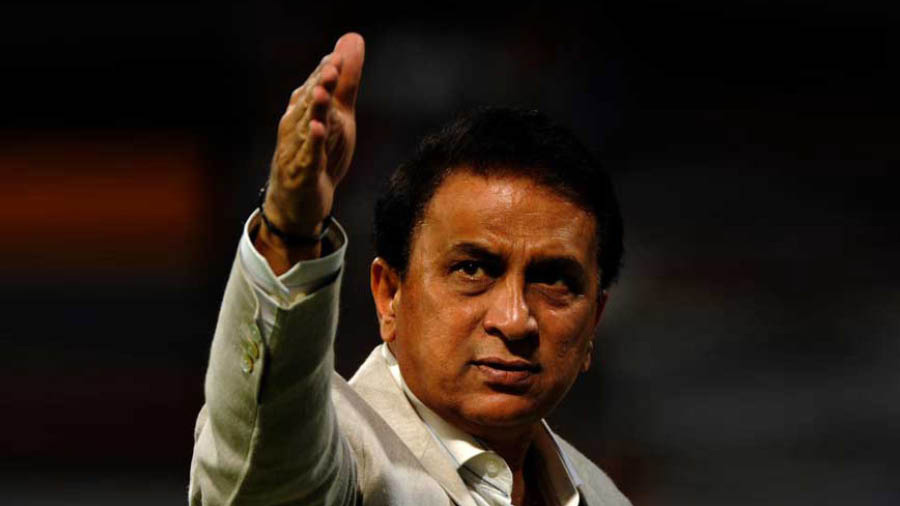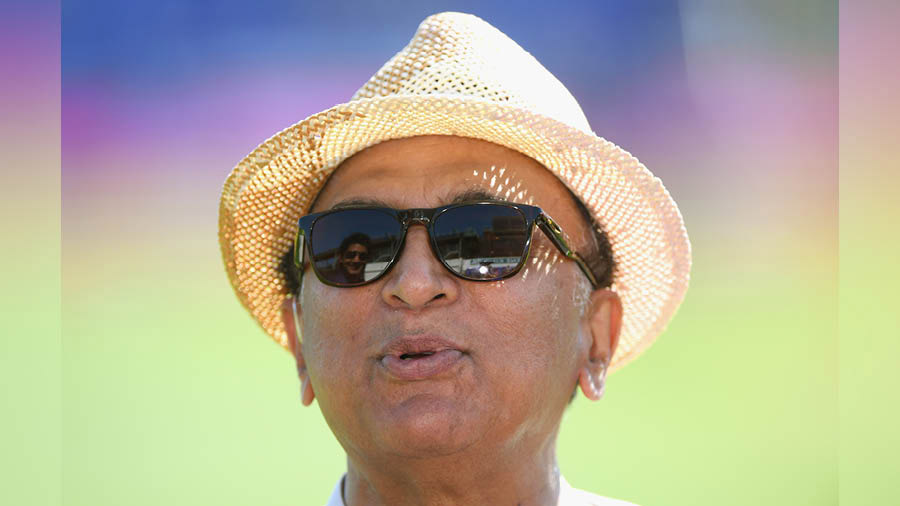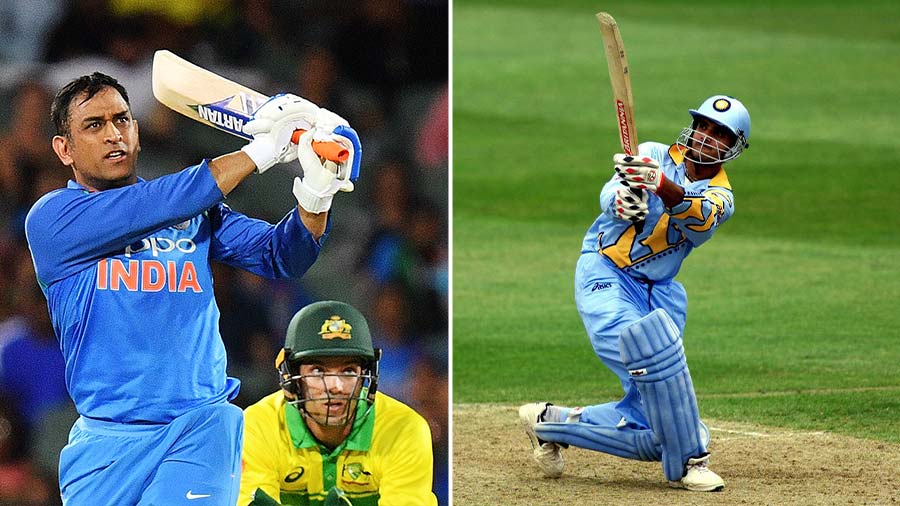Among the cricket clips going viral on Twitter these days is an excerpt from the infamous Test between India and Australia at Sydney in 2008 (the one involving the ‘Monkeygate’ scandal between Andrew Symonds and Harbhajan Singh). In the two-minute long footage, Sourav Ganguly has just been dismissed, after he was adjudged to be out by… Ricky Ponting. Umpire Mark Benson has deferred to the Australian captain in making his decision, which has naturally bewildered Harsha Bhogle on air. But while Bhogle is merely bemused, someone else on the mic is irate. Someone by the name of Sunil Manohar Gavaskar, who has this to say, or more accurately, unleash: “Why is it that a fielder’s (Ponting’s) word has to be believed and not the batsman’s (Ganguly’s)? Here is a man (Ponting) who did not walk when he was 14, caught down the leg side… It cannot be that you are honest when you are fielding and not so honest when you are batting. That is nonsense, utter nonsense.”
I was born more than a decade after Gavaskar last played international cricket. Having lived through most of Sachin Tendulkar’s prime and seen the likes of Virat Kohli and Rohit Sharma rise from modest ranks, Gavaskar’s batsmanship, consumed mostly through YouTube montages, did not leave me in awe. I admired his courage to play the most dangerous bowlers in the world without a helmet, but lacked the faculties or the worldview (of cricket) to truly appreciate his talent. What impressed me about Gavaskar, though, was his commentary, prone to outbursts such as the aforementioned one in Sydney. At a time when commentators have mastered the elegant euphemism, Gavaskar calls it as he sees (and feels) it. For better or worse. As the original Little Master turns 74, and his second innings (inside the commentary box) approaches its fourth decade, My Kolkata takes stock of how Sunny G became as unmissable on the mic as he was with the bat.
Curt, cerebral and seldom coy
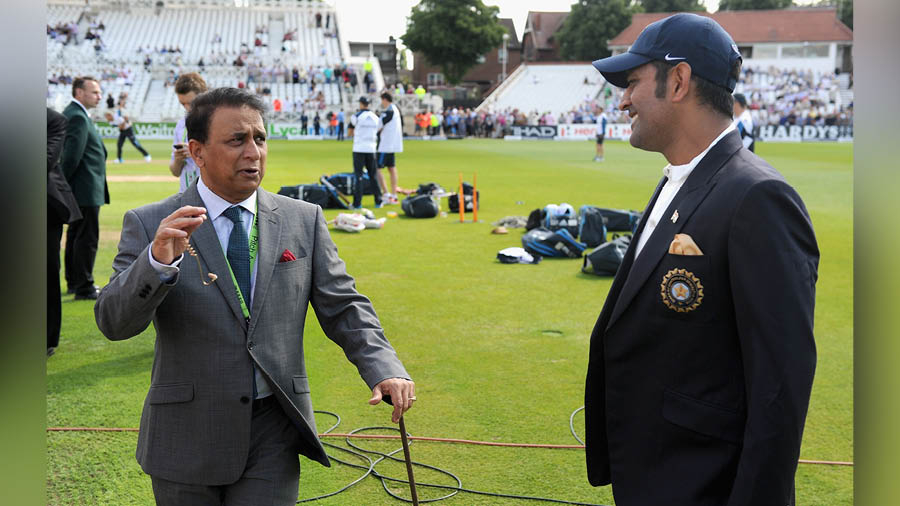
Gavaskar has enjoyed a good rapport with Indian players on air, including Mahendra Singh Dhoni Getty Images
I remember meeting Gavaskar at a media interaction in Kolkata in November 2017. Slighter than I had presumed, but possessing a commanding personality, Gavaskar barely uttered a word during the high tea, as guests took it in turns to shake his hand and click pictures (myself included!). But the moment the formal conversation began (moderated by a suave Gaurav Kapoor), Gavaskar was in his element. He joked about potentially being switched at birth, the pranks he and his teammates would play, the banter shared with Pakistani and West Indian cricketers as well as how Imran Khan had repeatedly advised him not to bat without proper headgear. Across 90 minutes, the audience was eating right out of Gavaskar’s hand, as one of India’s most cerebral cricketers played to the gallery in a way he would rarely do as a batter.
Gavaskar’s wit, charm and infectious energy that evening was a reflection of his effect on commentary in general, where his presence instantly lends gravity to the action. Unlike Ravi Shashtri, Gavaskar does not have any “tracer bullets” up his sleeve. Unlike Bhogle, Gavaskar is not inclined to aphoristic brilliance. But what Gavaskar brings to the table, by virtue of his stature in the game, is the right to opine without filters. For the first man to cross 10,000 runs in Test cricket, chastising batters, even bowlers, does not constitute overreaching. The fact that just about every one of his colleagues in the box reveres him also provides a certain heft to Gavaskar’s words. His may not be the most enigmatic voice at the most decisive juncture of the game, but few are better equipped at unpacking the action before and after. In this sense, Gavaskar is closer to Australia’s Ian Chappell than any of his Indian or English counterparts. Like Chappell, Gavaskar does not mince his words when it comes to the technical side of the game. But where he departs from the former Australian skipper is in his sense of humour, something Gavaskar has consciously cultivated, especially in Hindi, over the last decade or so.
From singing Bollywood songs during a tepid tea session to hyping his own bowling (he has two international wickets to his name), from gently teasing anchors to excelling in quips and repartees, Gavaskar has managed to remain relevant to generations of cricket fans who did not worship him as a batter and have no reason to cut him any slack. Having said that, Gavaskar’s genius on the mic has not been without its gaffes.
There is only so far Gavaskar is willing to go, even when he is on the attack
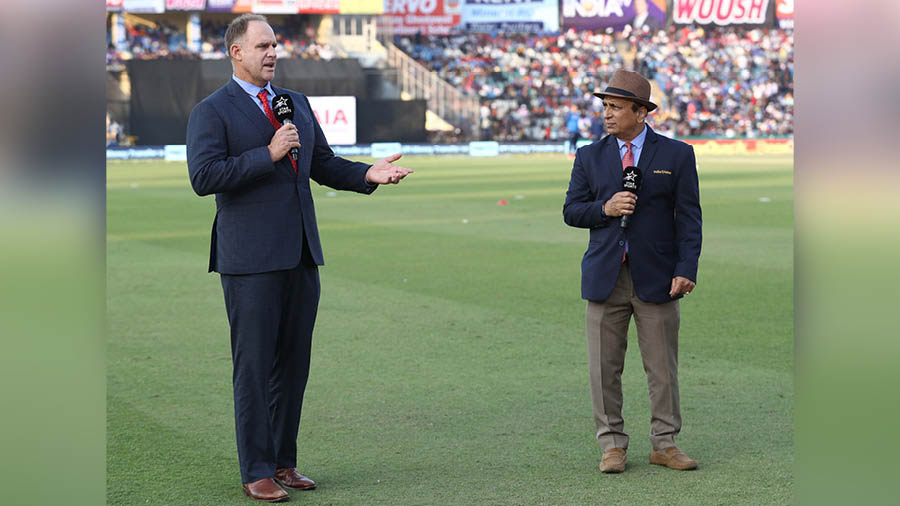
Matthew Hayden and Gavaskar share a fun chemistry in the commentary box Getty Images
Arguably the most notorious of Gavaskar’s slip ups came during the IPL in 2020, when he mocked Virat Kohli for having “only faced balls from Anushka [Sharma] during the lockdown”. On the surface, it was a tasteless remark, the kind of dinner table joke a patriarch would revel in without noticing the problem. What added fuel to the fire was Sharma calling out Gavaskar on Instagram, leading to Kohli and Sharma’s fans trolling Gavaskar for days. Two years later, Gavaskar was under fire for another comment made during the IPL, another instance of his implicit sexism when he said: “Shimron Hetmyer’s wife has delivered, will he deliver now for the [Rajasthan] Royals?”
When Gavaskar does not get trapped in front for trying to be funny at someone’s expense, he can sometimes appear tone-deaf, such as when he blamed Shane Warne’s lifestyle for his premature death, only hours after the world had discovered that the leg-spinner was no more. Apart from offending cricket’s who’s who, Gavaskar also managed to rub parents of budding cricketers the wrong way when he suggested that the IPL fix a salary cap for teenage players, since youngsters may lose the plot on earning too much too soon.
Not one to take an outright political stance, Gavaskar stepped out of character to ask the youth to “go back to the classroom” during the anti-CAA protests of 2019-20. Even though the 1983 World Cup winners, Gavaskar included, recently released a statement saying they were “disturbed” by the treatment of the Indian wrestlers in the ongoing controversy regarding charges of sexual harassment against Brij Bhushan Singh, Gavaskar’s habit of playing with a straight bat has usually been exchanged in favour of letting the ball go on matters beyond the cricket field.
All this explains why Gavaskar will never do a Michael Holding and deliver a moving monologue against discrimination and prejudice. Nor will he, in the manner of Gary Neville from football, expose the inherent flaws in the structure of a sport tainted by unbridled capitalism and conflict of interest (cricket even more so than football). Just like his batting days, there is only so far Gavaskar is willing to go, even when he is on the attack. For many, that is perfectly acceptable. After all, what is a cricket commentator’s business in facilitating broader conversations? For others, that is disappointing, indicative of a missed opportunity, wherein an icon, whose words will always be heard, abandons the duty to say anything of note.
In second gear in his second innings
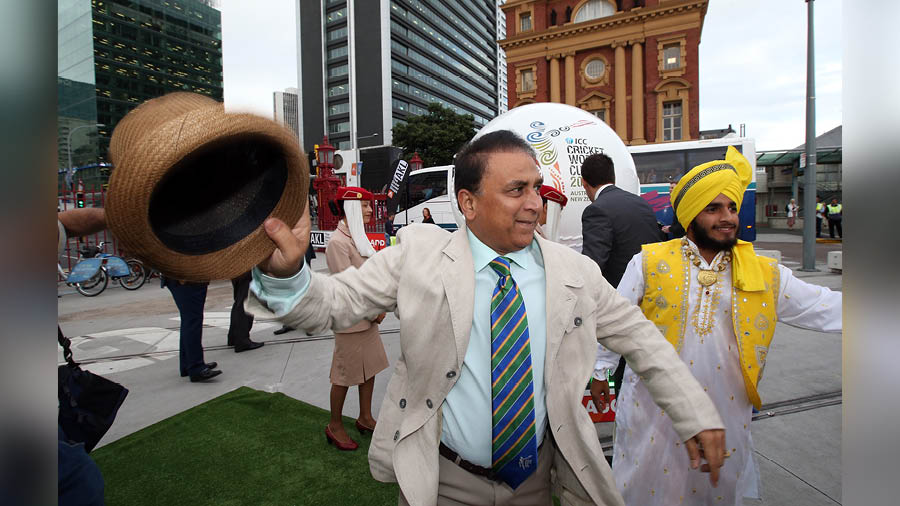
At this stage of his broadcasting career, Gavaskar has earned the right to do as he pleases Getty Images
Gavaskar could have catalysed a systemic shift in Indian cricket when he was appointed by the Supreme Court to be interim president of the BCCI in 2014. Instead, Gavaskar did the bare minimum, before giving up the opportunity to transform the sport from within for a return to cushy commentary. Having previously played his part in the restructuring of the Ranji Trophy as well as the formation of the National Cricket Academy (NCA), Gavaskar’s days in cricket development outside the corridors of power also seem to have passed.
For now, Gavaskar is where he belongs, calling more games than ever in more tongues than ever. Which also means that his intensity has dipped somewhat over the past couple of years. Sharpness and bold calls have made way for more insipid analyses, even though he remains capable of producing a knockout blow every now and then. For example, in reacting to England’s Bazball fielding strategy during the Ashes, Gavaskar described it as “setting a field for TV, rather than for getting wickets”.
At 74, Gavaskar has earned the right to do as he pleases. In fact, he had earned it long ago. Playing in second gear in his second innings may not be the most memorable way to usher in his twilight years in commentary, but it will still be good enough for thousands to hang on to his every word. As a batter, Gavaskar chose to quit the game at the top. As a commentator, one could make the case that Gavaskar’s best is behind him. Either way, Gavaskar’s voice will continue to animate Indian cricket for the time being, pleasing the ears of those who are grateful for his longevity, even as it irks those who will remember Gavaskar for everything he did not say.
